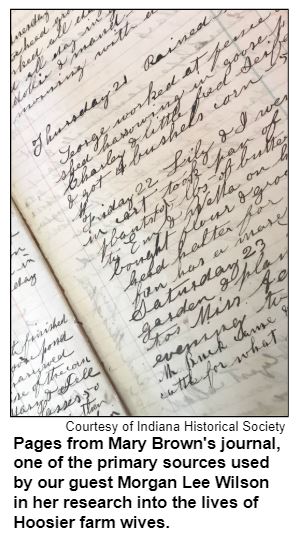Apr 3, 2020
Digging up details about the lives of farm wives in Indiana during the 19th century wasn't easy for historian Morgan Lee Wilson, who will be our guest as Hoosier History Live salutes Women's History Month.
Morgan, who lives on a small farm near Walkerton in St. Joseph County, has read diaries and letters written by rural women whose roles in agricultural life were crucial, but often unheralded and misunderstood by subsequent generations. Farm wives of the mid and late 1800s tend to be romanticized or described in "limited" ways, Morgan says.
Morgan, who works at the University of Notre Dame, says misperceptions include the notion that farm wives had isolated lives. Diaries and letters often describe, in Morgan's words, "social opportunities through trips to towns and churches."
Rather than being confined to kitchens and washbasins, farm wives of the 19th century often worked in fields, barns and gardens.

In her presentations across the state, Morgan frequently appears in the garb of a 19th century farm wife, although she does not portray a specific historical figure or a fictional, composite character.
With a fellowship from the Society of Indiana Pioneers, she undertook her extensive research, often analyzing diaries and letters in collections of the Indiana Historical Society.
History books about the state were not helpful because, as she puts it, farm wives "are not included in them."
Among the diaries and letters that Morgan analyzed were those written by farm wives in Tippecanoe County and Hancock County.
In poring over them, she says she quickly realized that, for rural married couples in Indiana, "the idea of 'separate spheres' and 'gendered roles' [was] pushed to the side in order to prioritize the success of the farm."
That's why many farm wives worked outdoors - and many of their husbands were involved in preparing meals for their families.
Morgan also advises against generalizations about 19th century farm wives: "Their work differed by region, religion and economic status."